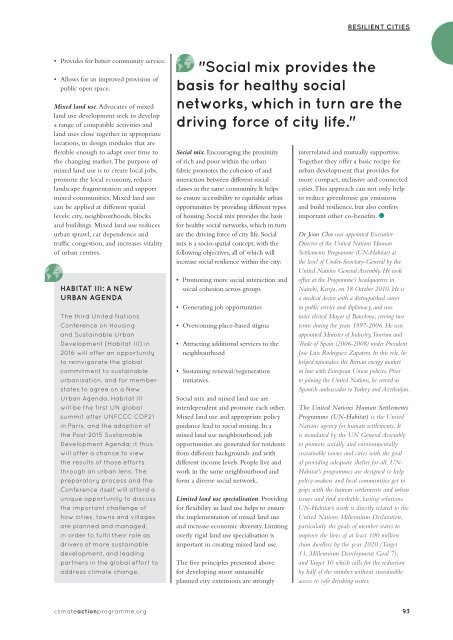Climate Action 2014-2015
You also want an ePaper? Increase the reach of your titles
YUMPU automatically turns print PDFs into web optimized ePapers that Google loves.
RESILIENT CITIES<br />
Provides for better community service.<br />
Allows for an improved provision of<br />
public open space.<br />
Mixed land use. Advocates of mixed<br />
land use development seek to develop<br />
a range of compatible activities and<br />
land uses close together in appropriate<br />
locations, in design modules that are<br />
flexible enough to adapt over time to<br />
the changing market. The purpose of<br />
mixed land use is to create local jobs,<br />
promote the local economy, reduce<br />
landscape fragmentation and support<br />
mixed communities. Mixed land use<br />
can be applied at different spatial<br />
levels: city, neighbourhoods, blocks<br />
and buildings. Mixed land use reduces<br />
urban sprawl, car dependence and<br />
traffic congestion, and increases vitality<br />
of urban centres.<br />
HABITAT III: A NEW<br />
URBAN AGENDA<br />
The third United Nations<br />
Conference on Housing<br />
and Sustainable Urban<br />
Development (Habitat III) in<br />
2016 will offer an opportunity<br />
to reinvigorate the global<br />
commitment to sustainable<br />
urbanisation, and for member<br />
states to agree on a New<br />
Urban Agenda. Habitat III<br />
will be the first UN global<br />
summit after UNFCCC COP21<br />
in Paris, and the adoption of<br />
the Post-<strong>2015</strong> Sustainable<br />
Development Agenda; it thus<br />
will offer a chance to view<br />
the results of those efforts<br />
through an urban lens. The<br />
preparatory process and the<br />
Conference itself will afford a<br />
unique opportunity to discuss<br />
the important challenge of<br />
how cities, towns and villages<br />
are planned and managed,<br />
in order to fulfil their role as<br />
drivers of more sustainable<br />
development, and leading<br />
partners in the global effort to<br />
address climate change.<br />
"Social mix provides the<br />
basis for healthy social<br />
networks, which in turn are the<br />
driving force of city life."<br />
Social mix. Encouraging the proximity<br />
of rich and poor within the urban<br />
fabric promotes the cohesion of and<br />
interaction between different social<br />
classes in the same community. It helps<br />
to ensure accessibility to equitable urban<br />
opportunities by providing different types<br />
of housing. Social mix provides the basis<br />
for healthy social networks, which in turn<br />
are the driving force of city life. Social<br />
mix is a socio-spatial concept, with the<br />
following objectives, all of which will<br />
increase social resilience within the city:<br />
Promoting more social interaction and<br />
social cohesion across groups<br />
Generating job opportunities<br />
Overcoming place-based stigma<br />
Attracting additional services to the<br />
neighbourhood<br />
Sustaining renewal/regeneration<br />
initiatives.<br />
Social mix and mixed land use are<br />
interdependent and promote each other.<br />
Mixed land use and appropriate policy<br />
guidance lead to social mixing. In a<br />
mixed land use neighbourhood, job<br />
opportunities are generated for residents<br />
from different backgrounds and with<br />
different income levels. People live and<br />
work in the same neighbourhood and<br />
form a diverse social network.<br />
Limited land use specialisation. Providing<br />
for flexibility in land use helps to ensure<br />
the implementation of mixed land use<br />
and increase economic diversity. Limiting<br />
overly rigid land use specialisation is<br />
important in creating mixed land use.<br />
The five principles presented above<br />
for developing more sustainable<br />
planned city extensions are strongly<br />
interrelated and mutually supportive.<br />
Together they offer a basic recipe for<br />
urban development that provides for<br />
more compact, inclusive and connected<br />
cities. This approach can not only help<br />
to reduce greenhouse gas emissions<br />
and build resilience, but also confers<br />
important other co-benefits. <br />
Dr Joan Clos was appointed Executive<br />
Director of the United Nations Human<br />
Settlements Programme (UN-Habitat) at<br />
the level of Under-Secretary-General by the<br />
United Nations General Assembly. He took<br />
office at the Programme’s headquarters in<br />
Nairobi, Kenya, on 18 October 2010. He is<br />
a medical doctor with a distinguished career<br />
in public service and diplomacy, and was<br />
twice elected Mayor of Barcelona, serving two<br />
terms during the years 1997-2006. He was<br />
appointed Minister of Industry, Tourism and<br />
Trade of Spain (2006-2008) under President<br />
Jose Luis Rodriguez Zapatero. In this role, he<br />
helped rationalise the Iberian energy market<br />
in line with European Union policies. Prior<br />
to joining the United Nations, he served as<br />
Spanish ambassador to Turkey and Azerbaijan.<br />
The United Nations Human Settlements<br />
Programme (UN-Habitat) is the United<br />
Nations agency for human settlements. It<br />
is mandated by the UN General Assembly<br />
to promote socially and environmentally<br />
sustainable towns and cities with the goal<br />
of providing adequate shelter for all. UN-<br />
Habitat’s programmes are designed to help<br />
policy-makers and local communities get to<br />
grips with the human settlements and urban<br />
issues and find workable, lasting solutions.<br />
UN-Habitat’s work is directly related to the<br />
United Nations Millennium Declaration,<br />
particularly the goals of member states to<br />
improve the lives of at least 100 million<br />
slum dwellers by the year 2020 (Target<br />
11, Millennium Development Goal 7);<br />
and Target 10 which calls for the reduction<br />
by half of the number without sustainable<br />
access to safe drinking water.<br />
climateactionprogramme.org 93












